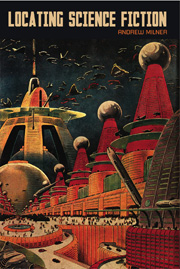Book contents
- Frontmatter
- Contents
- Acknowledgements
- List of Figures
- 1 Memories of Dan Dare
- 2 Science Fiction and Selective Tradition
- 3 Science Fiction and the Cultural Field
- 4 Radio Science Fiction and the Theory of Genre
- 5 Science Fiction, Utopia and Fantasy
- 6 Science Fiction and Dystopia
- 7 When Was Science Fiction?
- 8 Where Was Science Fiction?
- 9 The Uses of Science Fiction
- Works Cited
- Index
5 - Science Fiction, Utopia and Fantasy
- Frontmatter
- Contents
- Acknowledgements
- List of Figures
- 1 Memories of Dan Dare
- 2 Science Fiction and Selective Tradition
- 3 Science Fiction and the Cultural Field
- 4 Radio Science Fiction and the Theory of Genre
- 5 Science Fiction, Utopia and Fantasy
- 6 Science Fiction and Dystopia
- 7 When Was Science Fiction?
- 8 Where Was Science Fiction?
- 9 The Uses of Science Fiction
- Works Cited
- Index
Summary
We turn now to our third question, not that of what SF was, but rather of what it wasn't. It is obvious that SF isn't the romance or the Western or crime fiction, although there are hybrid instances of SF and each of these. There are even modernist–SF hybrids: one need look no further than Ballard's middle-period fictions. But the question of generic specificity really becomes acute only at the two points that will be our concern in this chapter, utopia and fantasy. If contemporary cinema and print publishing is any guide, fantasy is a far more socially influential genre than either SF or utopia. It is also clearly the oldest of the three, if we mean by fantasy, as most analysts do, fiction in which the novum is strictly incompatible with science, for example magic, the dream or the supernatural. Until comparatively recently, however, academic debates within SF studies have focused primarily on the relation between SF, utopia and dystopia, so it might be as well to begin by sorting through some of the semantic confusions that attach to these. The term ‘utopia’ was, of course, coined by Thomas More in 1516. The epigraphic hexastichon supposedly written by the Utopian poet laureate, Anemolius, and included in all four of the earliest editions of More’ s Utopia, reminds us that this neologism was, in the first instance, a Greek pun in Latin between ‘ou topos’, meaning no place, and ‘ eu topos’, meaning good place:
Utopia priscis dicta ob infrequentiam,
Nunc civitatis aemula Platonicae, …
Eutopia merito sum vocanda nomine.
[‘No-Place’ was once my name, I lay so far;
But now with Plato’s state I can compare, …
‘The Good Place’ they should call me, with good cause.]
(More, 1995, 18–19)- Type
- Chapter
- Information
- Locating Science Fiction , pp. 89 - 114Publisher: Liverpool University PressPrint publication year: 2012



